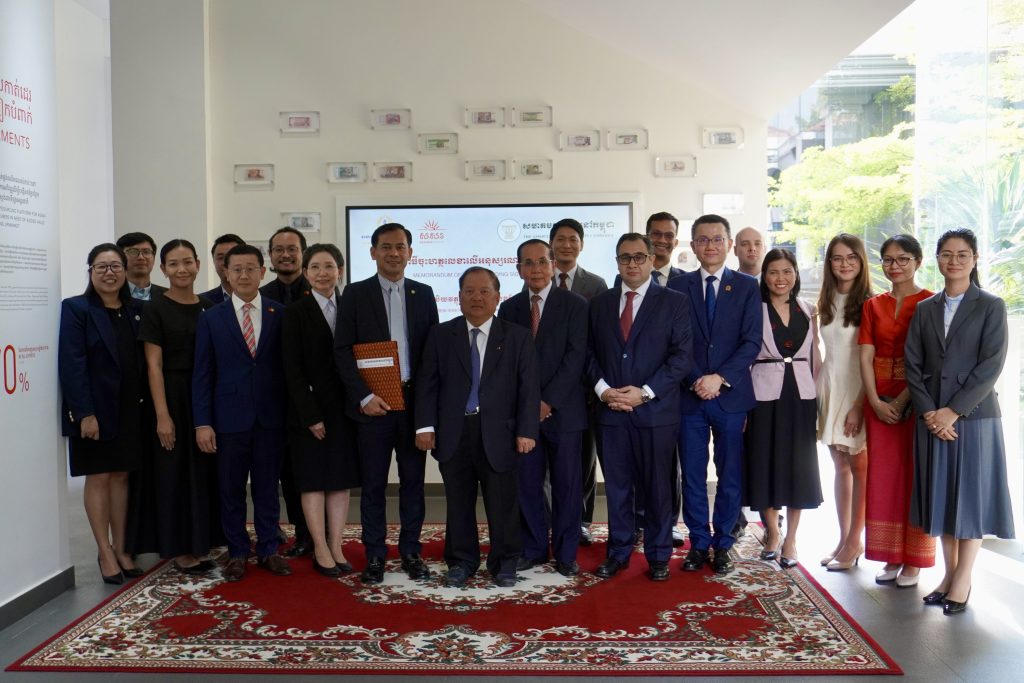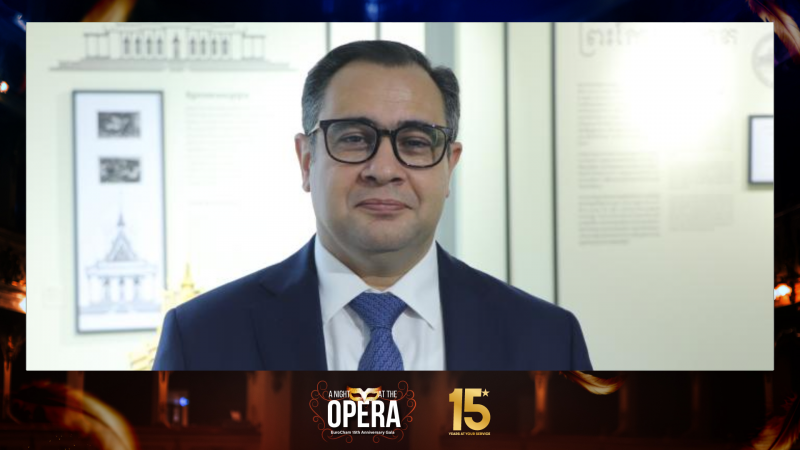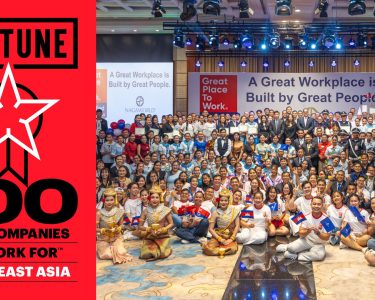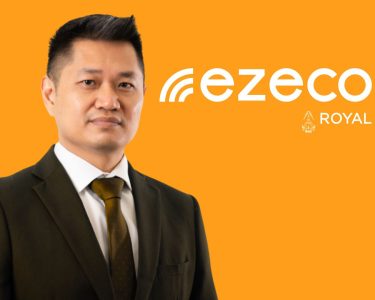By Henry Henderson
For this week’s interview, Junior Communications Officer Henry Henderson spoke with Blaise Kilian, former Executive Director of EuroCham and now Co-Director of the SOSORO Museum. Blaise reflected on his time leading the Chamber, the art of effective public-private advocacy, and how his experience at EuroCham has shaped his approach to building partnerships between business, government and cultural institutions in Cambodia.
Henry: You first joined EuroCham in 2015 as Advocacy Manager before becoming Executive Director three years later. How did this journey help you develop a deeper understanding of the Chamber’s mission and Cambodia’s business environment?
Blaise: I joined EuroCham after having spent nine years in UNESCO, and I therefore conceived this professional move as a way to come back closer to the corporate world, and to economics in general. In this regard, my expectations were fulfilled as my job in the Chamber allowed me to acquire a deeper understanding of the private sector challenges and opportunities in Cambodia and of the dynamics at play.
As for the Chamber’s mission, we had a mandate given to us through our statutes and by our membership, but also through the EU funds secured by the ICI+ program, which were allocated to help us achieve this mission. The broad mandate was therefore clear: membership, advocacy, services, outreach. But thanks to the outstanding leadership of our then-Executive Director, Ratana Phurik-Callebaut, we had the fantastic opportunity to shape this mandate and to design the programs that would enable us to fulfill it.
Overall, it was a tremendously enriching experience: the more we did, the more we learned, the more we achieved. And during these few years, our appetite for action was insatiable. When I took over from Ratana in 2018, my focus was on maintaining the very high standards she had set for the Chamber and on continuing to push the limits in all directions. These were extremely intense but very rewarding years, and for me a truly transformative experience.
Read More: SOSORO Museum Unveils Lost Murals of Phnom Penh’s Silver Pagoda
Henry: Since leaving the Chamber, you have become Co-Director of the SOSORO Museum, a joint initiative with the National Bank of Cambodia. How does this position fit within your professional journey?
Blaise: The SOSORO Museum stands at the crossroads of everything I have done in the past, not only at EuroCham but also at UNESCO, at the Royal University of Law and Economics where I taught for several years, and in the private sector where, many years ago, I worked for a local airline and at the airport. However, my time with EuroCham most certainly helped me to make a difference because I entered the museum with the same mindset that I had acquired during the past five years. EuroCham is a membership-based organisation where you need to constantly reach out to your members and provide them with events and services that will satisfy them. In a way, I tried to apply the same recipe of creativity, dynamism, and communication to the museum. I believe that is what helped me the most in my efforts to make SOSORO a dynamic, lively, and attractive knowledge center for the public.
Henry: EuroCham maintained regular dialogue with multiple ministries and institutions under your leadership. How did you balance the Chamber’s advocacy objectives with maintaining strong, constructive relationships with government counterparts? Were there any valuable strategies for bridging the gap between the public and private sectors?
Blaise: I was hired to create and run the advocacy program, and I was very lucky to benefit from the full trust and constant support of our Executive Director from day one. Later, when I was selected to take over the post of ED, then-Chairman Arnaud Darc insisted that, as a condition, I should remain in charge of Advocacy which therefore was really my field of predilection throughout all these years. To me the methodology is rather simple: First, everything one does, wherever one might be, must be context sensitive. If you do not understand your interlocutors, or where they come from, do not hope that they will understand you; and that remark is valid both for what you say and how you say it.
Second, it’s about finding mutual ground, and being indeed constructive. We are not here to point fingers or criticise. We are here to work together in addressing common issues through mutually benefitting solutions. This is exactly how we conceived the White Book where every issue raised is first and foremost a sectoral issue, not the issue of one individual company. We show how this sectoral issue is impacting Cambodia as an investment destination, and therefore why our government interlocutors and us have a common interest in solving it. And finally, we propose a solution that is reasonable, that takes into consideration the constraints of our interlocutors, and that is open for discussion.
Besides this, I believe it is strategically very important to create connections, and even alliances with other chambers: the more you are to raise the same issue, the more likely the Government might pay attention to you. During that time, I reached out to other chambers, local and international, and industry federations to build a larger collective voice. Advocacy is all about common interest, which is the opposite of lobbying where one player tries to influence the game in their favor only. In the end, we all share the same objective: to keep improving Cambodia’s business environment for each and every investor, local or foreign.

Henry: Having observed Cambodia’s development for over two decades, how do you view the evolution of the business environment since your time at EuroCham? What have been the most significant developments?
Blaise: If I look back and compare Cambodia in 1999, when I first arrived, with today, I always have this feeling of amazement. I arrived in a horizontal capital-city filled with mud-streets in the rainy season and today we have this vertical, bustling urban landscape where infrastructure keeps growing. Social behavior and consumer behavior have considerably evolved, keeping in mind that 50% of the population is below 25 years old. The economic growth that took place continuously between the late 1990’s and 2019 (when Covid struck) has lifted a considerable number of people out of poverty, something that can be witnessed not only in Phnom Penh but throughout the entire country. Overall Cambodia is much better off today than it was 25 years ago.
This achievement should be acknowledged, and it gives a lot of hope for the next decades because back then, even the most optimistic would not have bet on what Cambodia has now become. Of course, any challenges remain, and some new challenges were born out of this booming growth, whether it is from the structural, regulatory, or practices perspectives. The advocacy work must keep going, and it is up to the current teams to decide whether the approach that was previously undertaken should remain the same or not. The most important thing is to keep engaging and working on constructive solutions. My personal view is that the growth model that prevailed for more than two decades before Covid worked very well, but there is now a need to find the key that will unlock the next phase of social and economic growth.
Cambodia needs new skills to enable wider diversification and higher added value throughout its industrial landscape; it needs to upgrade its SME landscape to better plug it to the formal economy and hopefully create backward linkages that will spread growth and opportunities; it needs to finally make its agricultural sector live up to its potential; it needs a larger panel of international partners to ensure it depends on no-one entirely (and that goes for exports as much as for FDI). The international and domestic scenes face new challenges, and the growth model will have to evolve accordingly. I believe most people have a similar assessment, the question being how it is going to be achieved and how to enable the private sector to participate fully in this structural transformation.
Henry: Looking ahead, what do you think will be the most important trends to watch in Cambodia’s business landscape in the coming years?
Blaise: There are many sectors that present tremendous potential, or whose own insufficiency offer great opportunities. Education, health, light industry, IT of course… But beyond that I think that what will matter most is the way the regulatory sector evolves, and how it can become more complete, more enabling, and clearer for all. Cambodia’s economic development has reached a stage where newcomers will less and less tolerate approximation. A corollary to that is the necessary intensification of inter-governmental coordination, as the increased sophistication of Cambodia’s economic landscape requires more and more that various agencies work together so that investors, whether local or international, can navigate through a smooth and streamlined regulatory environment. This leads me to a last remark that has always been a hot topic: the need for a level playing field so that all businesses can compete equally, namely face the same regulatory obligations. These are not new topics, but as Cambodia keeps growing, it becomes increasingly necessary to address them.
Henry: With the unique perspective you’ve gained through your work with EuroCham and within the private sector, what advice would you give to businesses trying to establish themselves in Cambodia?
Blaise: Cambodia is a very welcoming country. People are kind; the city has kept a human size; thanks to growing infrastructure, provincial destinations rich in nature and heritage are now easier to reach; life can seem easy and very comfortable, especially for foreign visitors. And it’s true that most people who settle here feel at home. But this should never deter investors from one thing that is true everywhere: do your homework; take your time; do not look for shortcuts and easy paths. Be compliant from day one. Temptations to do otherwise are multiple and summarised in some sentences such as “don’t worry, it’s Cambodia” or “I know someone who is close to someone”. If you hear this, start being cautious, take serious advice, and make sure you play by the book. Otherwise, your negligence might come back and haunt you later. Besides that, engage with your chamber or join one. Sharing experience is useful and collective voice is the most efficient tool at your disposal to make things move in the right direction.





